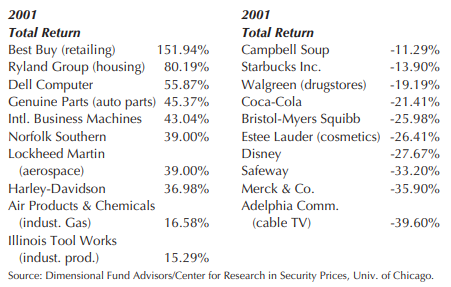U.S. economic activity reached a peak in March 2001. Conventional wisdom suggests that at the onset of recession, investors should avoid the stocks of companies selling big-ticket items because nervous consumers or businesses might defer these purchases and instead focus on firms that are ostensibly unaffected by GDP trends. Following this logic, an investor would have avoided companies selling homes, jets, computers, and pricey motorcycles in favor of soft drinks, lipstick, movies, and cough drops.
The financial media is quick to exploit this by presenting “experts” who exhort investors to pursue sectors that are “bargains” or to avoid stocks in industries that are “too pricey” in light of recent macroeconomic trends. The table below depicts the performance of these widely-held stocks in 2001 and demonstrates the challenge of using short-term economic forecasts to enhance portfolio returns. Investors who shunned technology stalwarts Dell Computer and IBM in favor of “safety-net” stocks Campbell Soup and Merck would have been sorely disappointed.

Investors should avoid the temptation to alter their portfolios in anticipation of economic trends. The articles that follow provide our recommended portfolio allocations and describe our reasoning in formulating these guidelines. These are not based on short-term prognostications, although we carefully weigh long-term trends in overall market valuations in setting these allocations.
Also in This Issue:
Quarterly Review of Investment Policy
Common Stocks: An Update
The High-Yield Dow Investment Strategy
Recent Market Statistics
The Dow-Jones Industrials Ranked by Yield
To access the full article, please login or subscribe below.
Already a Subscriber?
Log in now
Subscribe Today
Get full access to the Investment Guide Monthly.
Print + Digital Subscription – $59/YearIncludes 12 Print and Digital Issues
Print + Digital Subscription – $108/2 Years
Includes 24 Print and Digital Issues
Digital Subscription – $49/Year
Includes 12 Issues
Digital Subscription – $98/2 Years
Includes 24 Issues

